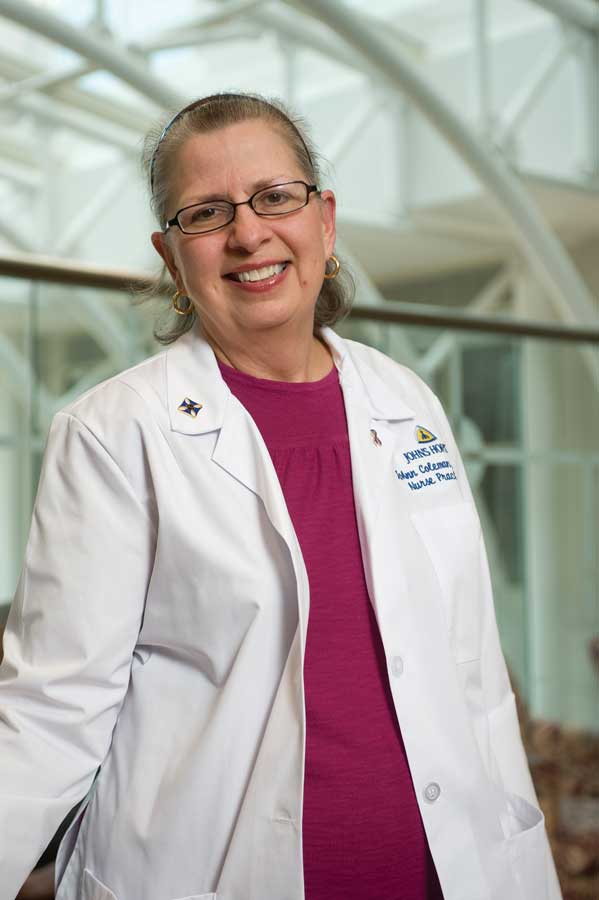By Sarah Achenbach
Over the past 35 years at Johns Hopkins, JoAnn Coleman, MS, RN, ACNP, AOCN, Postmaster’s CRNP ’95 has developed an impressive expertise in the relatively new field of surgical geriatric oncology. She began her nursing and Hopkins career in 1974 as a surgical nurse, a job she held for 33 years before joining the Sidney Kimmel Comprehensive Cancer Care Center in 2006 as the acute care nurse practitioner and coordinator of the Pancreas Multidisciplinary Cancer Clinic. “I just liked the blood and bile,” Coleman jokes about her initial choice to go into surgery.

As her Hopkins career and the field of geriatrics evolved, so did her interest in working with seniors, a group with whom her good humor and glass-half-full outlook mesh well. “First geriatrics became a medical specialty, and geriatric oncology evolved from that,” she explains. “In the late 1990s, surgical geriatric oncology became recognized as its own specialty, and my career has hit all three.”
In 1984, Coleman became a clinical nurse specialist in gastro-intestinal surgery, and about half of her patients were 65 or older, she says. She is currently enrolled in the Hopkins Doctor of Nursing Practice program-focused on the elderly. But, perhaps, her most effective skill comes from her first, short-lived career as a teacher in the early 1970s. “What do you do as a nurse?” she asks. “You teach.”
This is exactly Coleman’s forte in the Kimmel Center: teaching oncology patients recently diagnosed with pancreatic cancer how to traverse what can be a frustrating, confusing labyrinth of doctors, tests, results, and decisions. “In the evaluation clinic, which is the first of its kind at Hopkins, patients complete scans, blood work, comprehensive history and physical examination, meeting with oncology dietician, social work and other support services all in one day,” says Coleman. “Before, patients were literally taking up to six weeks to get through it all.”
Coleman coordinates the clinic’s patient tests and educates patients and their families about elderly-specific issues that could affect treatment, such as frailty, other health issues, and whether or not the patient lives alone. She also oversees the multidisciplinary clinical team (oncologists, pain specialists, social workers, nutritionists, nurses, genetic counselor, and others) that reviews each patient’s case and recommends a plan of treatment. “As medicine makes continued advances and people are living longer, we encounter more elderly patients, who have more issues than ‘middle-aged’ patients,” says Eillen Satterfield, Client Service Coordinator for Oncology. “JoAnn has seen firsthand the evolution of the field, and has a great deal of knowledge, experience and patience when interacting with older patients.”
Coleman chuckles that most of the time, she’s “just keeping her head above water,” but she loves her job. “I just have an affinity for the elderly,” says Coleman. “When patients come to the clinic, they are usually on edge, but I believe older people can be more resilient than younger patients. My job is to put people at ease. There is always a way to make people more comfortable in a hectic medical environment.”
